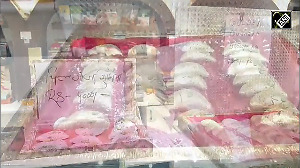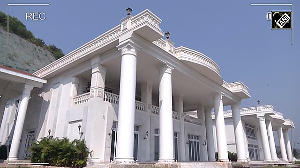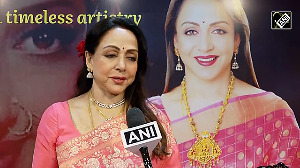With an attempt to chalk out a strategy for the next Lok Sabha polls, the Congress top brass on Friday huddled in Surajkund, Haryana, to deliberate on political and economic issues.
The meet, attended by top central ministers and Congress Working Committee members, will also see the party reviewing the extent of implementation of the promises made in its manifesto for the 2009 Lok Sabha elections.
Rahul Gandhi, who is set to assume a 'larger role' in the organisation, is attending the session amid indications that the party reshuffle would have the imprint of the young leader.
The exercise has come amid concerns within the party over 'limitations' in implementing its programmes and agenda in a coalition government. The prime minister had time and again talked about coalition compulsions in governance.
Ahead of the meeting, Finance Minister P Chidambaram had said that the achievements of the government in the last three years and nine months are "quite impressive".
Party general secretary Janardan Dwivedi has conceded that "there are some limitations in a coalition government."
Party president Sonia Gandhi will set the tone for the discussion on the current political situation in the meeting, after which Prime Minister Manmohan Singh will brief leaders on the economic challenges and the measures initiated by the government.
Chidambaram will initiate the debate on economic issues after the prime minister's speech.
The issue of alliances could figure at the 'dialogue meeting' at Surajkund which is being held for the first time since the exit of Trinamool Congress from UPA-II and growing speculation of early Lok Sabha elections.
Party sources said the dialogue meeting (samvad baithak) will virtually set the agenda for the larger brainstorming at chintan shivir, which is likely to be organised in January.
The dialogue session comes after the public meeting on November 4, which saw party president Sonia Gandhi and her son Rahul strongly backing the economic reform measures initiated by Dr Singh.
Dwivedi said a total of 70 leaders including 23 Cabinet ministers, 12 ministers of state (independent charge), 19 members of Congress Working Committee and 16 permanent invitees to the CWC will be attending the deliberations.
Interestingly, party chief ministers have not been invited for the session and they will be called for the chintan shivir with Pradesh Congress Committee chiefs.
The meeting is not going to pass any resolution as it has been called for greater interaction between the party and the government on the challenges ahead, Dwivedi said.
The first such brainstorming session was held at Pachmarhi in 1998 soon after Sonia Gandhi took the reins of the organisation from Sitaram Kesri. The next one was held in 2003 at Shimla shortly before the 2004 Lok Sabha elections.
While the official line at Pachmarhi was that coalition is a transient phase in Indian politics, the one at Shimla was about the unity of secular forces, which helped the Congress come to power for the first time via the coalition route in 2004 after it ousted the Bharatiya Janata Party-led National Democratic Alliance
After securing more than 200 seats in the 2009 Lok Sabha elections and improving its tally substantially, Congress has failed to make a mark in key assembly elections in Uttar Pradesh, Bihar and Tamil Nadu. The meeting comes ahead of the assembly polls in BJP-led Gujarat where Chief Minister Narendra Modi is seeking a third term.










 © 2025
© 2025